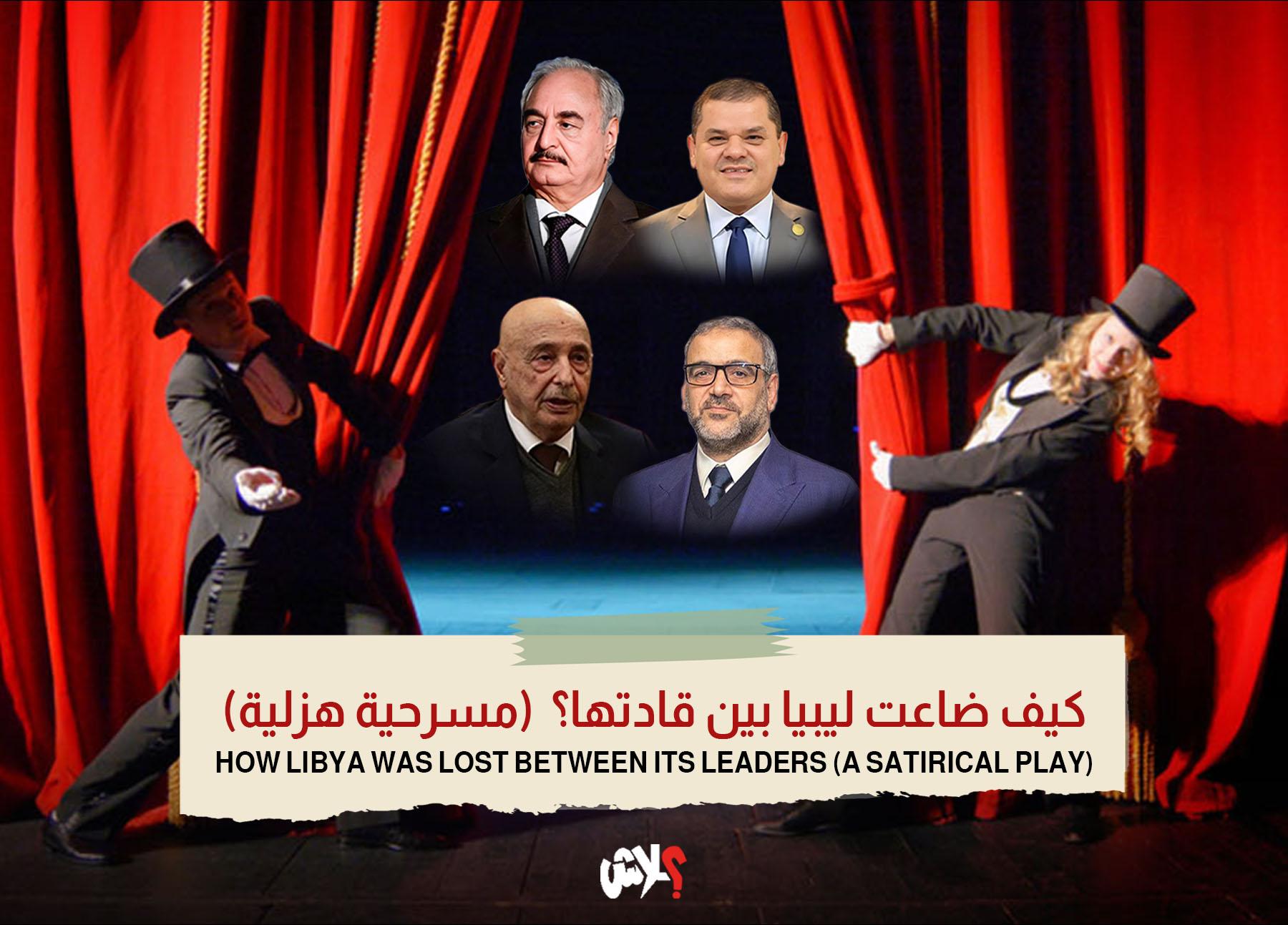How Libya Was Lost Between Its Leaders: A Political Farce
Analyzing the current Libyan political scene has become increasingly complex. The maneuvers of Aguila Saleh, Khaled Al-Mishri, Abdulhamid Dbeibah, and Khalifa Haftar reveal the depth of the country’s ongoing crisis. These moves described by some as farcical performances seem like desperate attempts to gain international attention and signal superficial reconciliation, while all four actors repeatedly fail to reach a real solution or form a unified government.
Aguila Saleh and Khaled Al-Mishri have been trading roles in obstructing any efforts at political consensus. For years, both have demonstrated an unprecedented ability to derail any initiative aimed at stability. Instead of prioritizing national interests, they’ve focused on building networks of personal loyalty and securing their own political survival, even at the expense of Libya’s future.
Every time an agreement or initiative emerges, their tactics to sabotage it become evident designed to preserve their narrow gains. Recently, however, Al-Mishri has grown weaker, particularly as his former Turkish ally has shifted focus to interests in eastern Libya and closer ties with dominant forces there.
Meanwhile, Abdulhamid Dbeibah has played a pivotal role in further complicating the crisis. Originally appointed to lead a transitional government toward elections, he managed to extend his grip on power by exploiting institutional voids and Libya’s state resources. He has built a formidable power base, capitalizing on the country’s economic collapse. His latest moves reveal sharp political savvy: positioning himself as the international community’s “realistic choice” for stability. By organizing summits and festivals, he seeks to draw support while weakening any attempt to form a new government even at the cost of a unified Libyan state.
Khalifa Haftar remains one of the most polarizing and influential figures in the Libyan landscape. He draws power from multiple sources his military control over vast territories, especially oil- and gas-rich areas, gives him a powerful bargaining chip in negotiations with international actors. His alliances with key tribal groups provide him with a significant social and political base that helps him withstand both internal and external challenges. Alongside hydrocarbons, gold mines also play a strategic role in funding his operations, bolstering his ability to maneuver politically and economically. Haftar presents himself as the only viable option for stability, especially in the eyes of global powers seeking to secure continued oil and gas flows while protecting their strategic interests. But the question remains: how long can Haftar maintain this role amid Libya’s chaotic political landscape and mounting opposition at home and abroad?
The dynamic between these four players reflects an intense power struggle, with each seeking to exploit the chaos to maintain or expand their influence. Aguila Saleh and Khaled Al-Mishri are actively working to undermine Dbeibah’s legitimacy despite the fact that he was initially granted confidence by both the House of Representatives and the High Council of State. Together, they attempt to revoke his mandate through political and sometimes military maneuvers, often aligning with Haftar to weaken Dbeibah and strengthen their own position in the battle for power. However, this alliance is not based on a clear strategic vision; it is an opportunistic coalition waiting to seize power at the first opening.
Dbeibah, for his part, continues to survive these pressures, using the divisions among his rivals to his advantage. He skillfully navigates political and military currents, forming temporary alliances with armed groups and influential factions. He understands that ground control translates to political leverage, which is why he invests in armed formations under his authority funded by his management of state resources. This strengthens his position with Western powers, who often favor those with real influence on the ground.
With Haftar in the equation, tensions escalate further. He is a military force not to be underestimated, seeking to expand his political and military clout in eastern Libya. His alliance with Aguila and Al-Mishri reinforces their joint strategy to challenge Dbeibah’s legitimacy by boosting their power across various regions. Despite these temporary alliances, Haftar remains a key driver of the conflict, leveraging his military strength to pursue political goals.
Domestically, Libyan citizens are sinking deeper into frustration as political paralysis continues, basic services deteriorate, and the economy collapses. This growing discontent is not just a reflection of elite detachment from public suffering it’s evidence that the real priorities of these leaders are disconnected from people’s everyday needs. The ongoing crisis risks sparking a popular uprising that could upend the power equation though such a scenario carries its own risks to Libya’s fragile stability.
The current Libyan political scene is a clear reflection of leadership and institutional failure, where personal and regional interests dictate the country’s trajectory. The continued presence of Aguila Saleh, Khaled Al-Mishri, Abdulhamid Dbeibah and the prominent role of Khalifa Haftar only deepens Libya’s fragmentation and makes any solution more elusive. The country now faces grim options: continued deadlock and possible internal escalation leading to a new wave of violence, or a more forceful international intervention to impose a compromise.
What’s unfolding in Libya today is not merely a dispute over forming a government. It is a manifestation of the political elite’s failure to rise above self-interest and govern for the good of the nation. The performances of Aguila, Al-Mishri, and Haftar, alongside Dbeibah’s maneuvers, are just recurring acts in a long-running saga that widens the trust gap between citizens and their rulers. Unless there is a fundamental shift in political behavior, Libya will remain trapped in a cycle of chaos and unrelenting stagnation.

